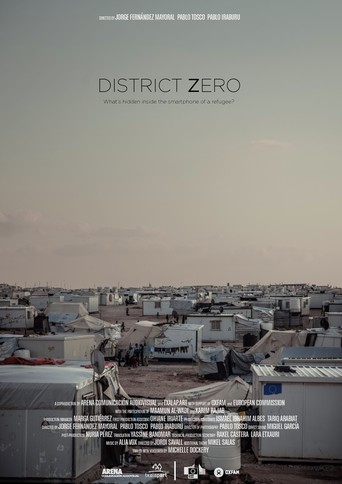District Zero
In Zaatari, Jordan – one of the world’s biggest refugee camps – Maamun owns a little shop: a small white container aligned in a seemingly endless row of identical containers. There he repairs mobile phones of the numerous Syrian refugees. They are anxious to retrieve the devices’ content which consists of memories from the past, a time when the war had yet to begin and they were not yet refugees but just ordinary people. Maamun and his friend Karim invent a new way to satisfy their customers: they buy a printer to print the photos, allowing the camp dwellers to retrieve some of their identity. The film provides an insight into the daily goings-on in a refugee camp. In Zaatari, Jordan – one of the world’s biggest refugee camps – Maamun owns a little shop: a small white container aligned in a seemingly endless row of identical containers. There he repairs mobile phones of the numerous Syrian refugees. They are anxious to retrieve the devices’ content which consists of memories from the past, a time when the war had yet to begin and they were not yet refugees but just ordinary people. Maamun and his friend Karim invent a new way to satisfy their customers: they buy a printer to print the photos, allowing the camp dwellers to retrieve some of their identity. The film provides an insight into the daily goings-on in a refugee camp. In Zaatari, Jordan – one of the world’s biggest refugee camps – Maamun owns a little shop: a small white container aligned in a seemingly endless row of identical containers. There he repairs mobile phones of the numerous Syrian refugees. They are anxious to retrieve the devices’ content which consists of memories from the past, a time when the war had yet to begin and they were not yet refugees but just ordinary people. Maamun and his friend Karim invent a new way to satisfy their customers: they buy a printer to print the photos, allowing the camp dwellers to retrieve some of their identity. The film provides an insight into the daily goings-on in a refugee camp. In Zaatari, Jordan – one of the world’s biggest refugee camps – Maamun owns a little shop: a small white container aligned in a seemingly endless row of identical containers. There he repairs mobile phones of the numerous Syrian refugees. They are anxious to retrieve the devices’ content which consists of memories from the past, a time when the war had yet to begin and they were not yet refugees but just ordinary people. Maamun and his friend Karim invent a new way to satisfy their customers: they buy a printer to print the photos, allowing the camp dwellers to retrieve some of their identity. The film provides an insight into the daily goings-on in a refugee camp.



 AD
AD